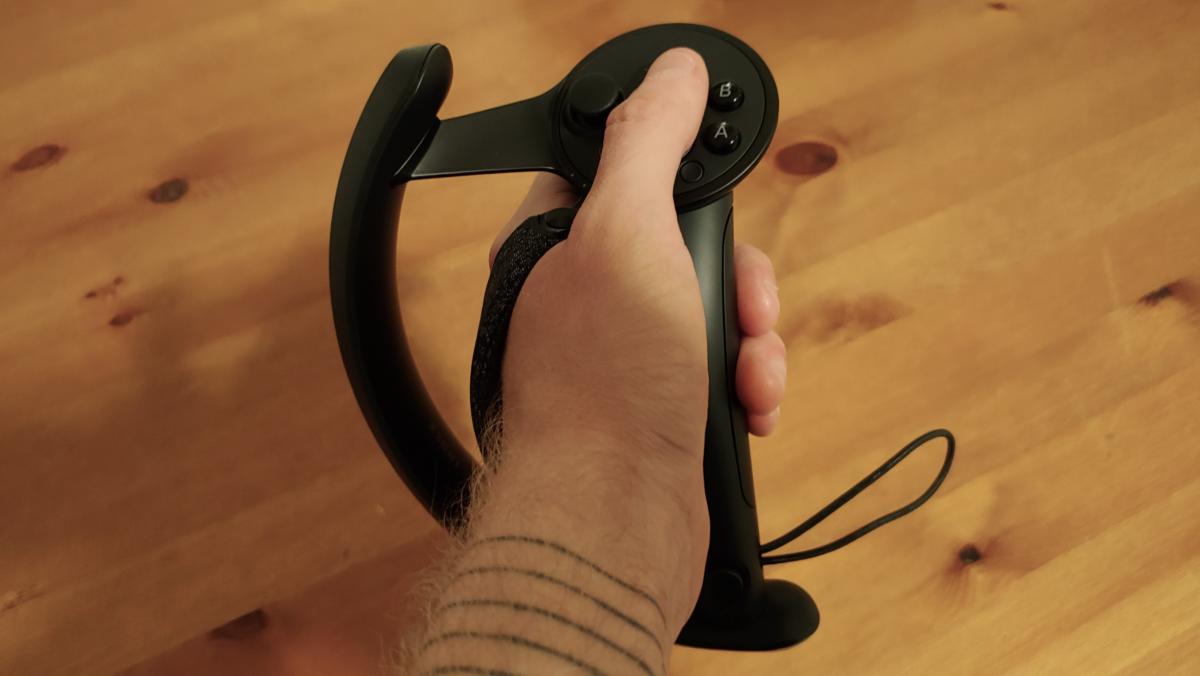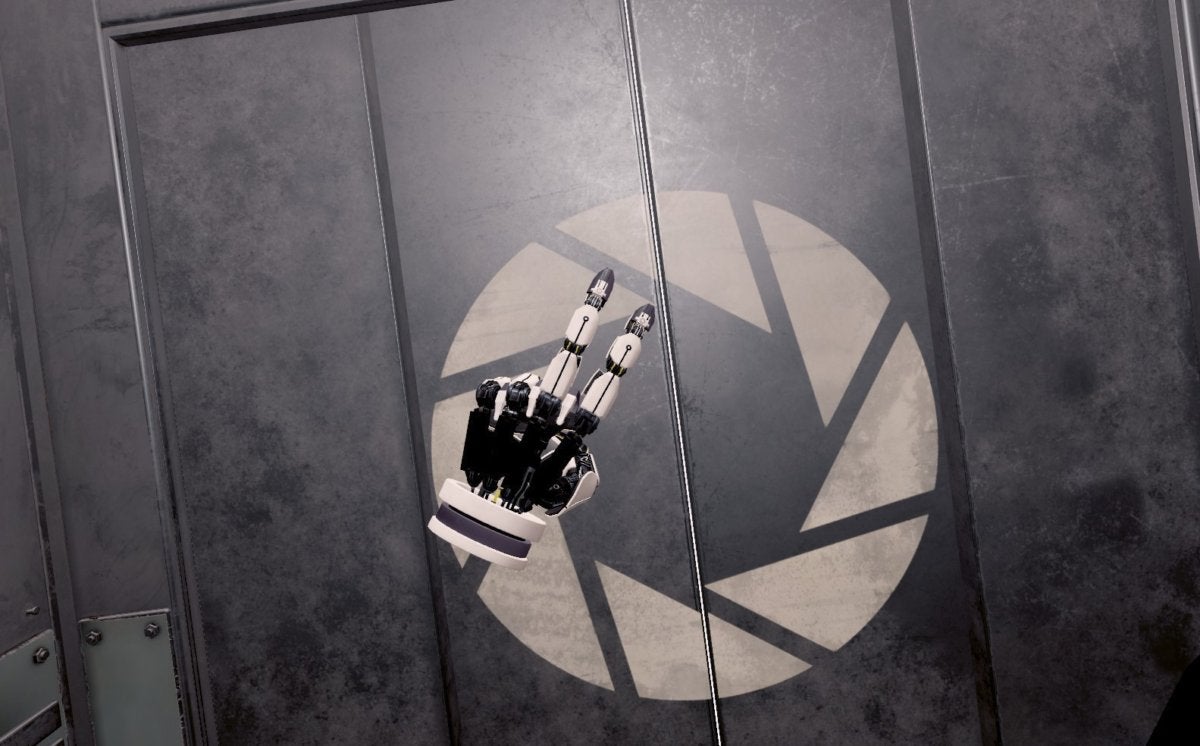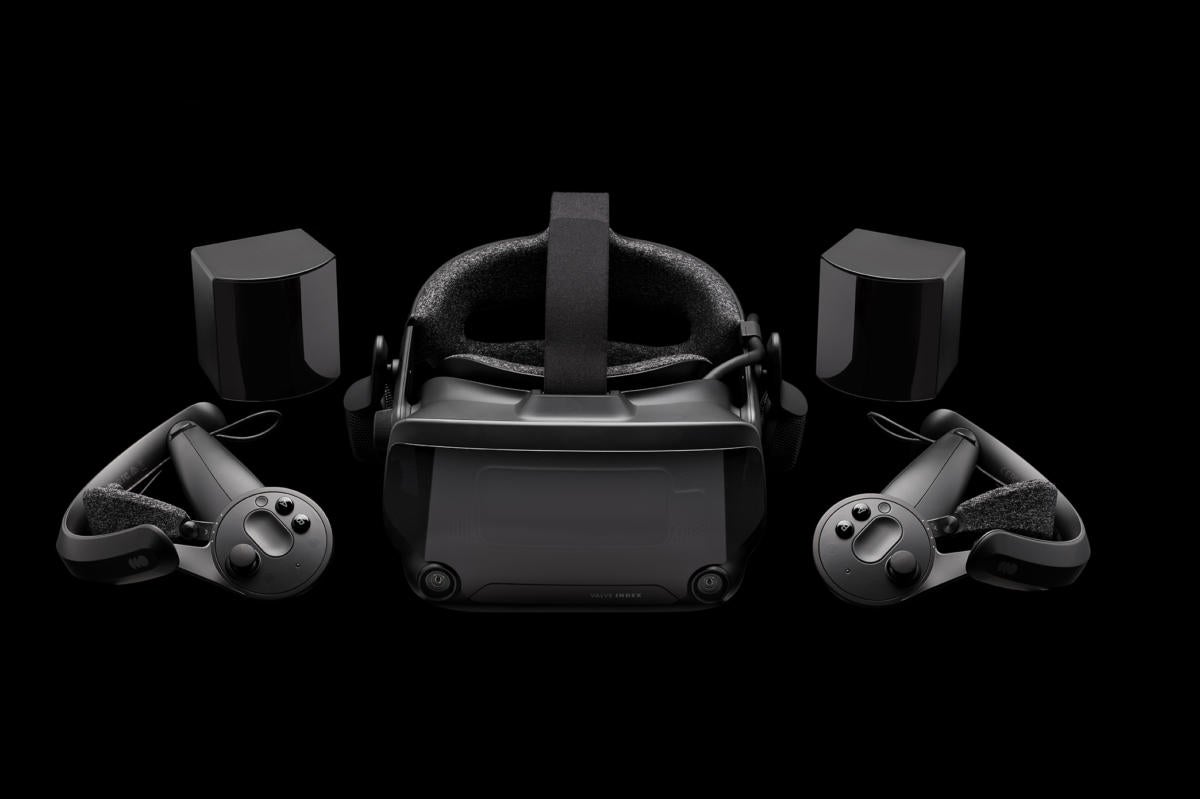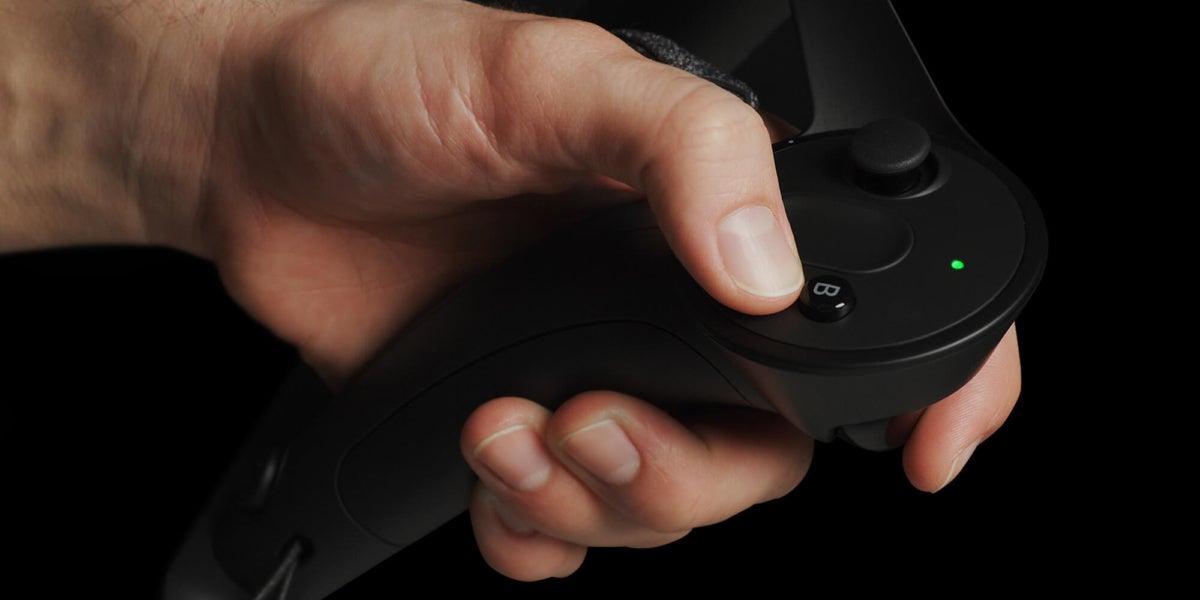Valve Index Controllers review: These revolutionary VR controllers need patience to hit full potential - pannellcapent
Last calendar month we put out some initial impressions of Valve's new Index virtual reality headset. I've now used it broken in my home for about a calendar month, and the first units are going dead set consumers, which means it's time for a proper review.
IT's a number odd though, reviewing the Index. Valve's hands-off go up to its hardware, its lead-and-the-developers-will-trace mindset, means the Index's first few steps into the public eye are much tepid than I would've likable. The hardware is groovy. The software support to that extent? To a lesser extent so.
The knock-on effect is that at release, the Index headset feels like a zealous investment, an incremental but significant step to the fore for those who want the best fidelity money butt buy. The so-called "Knuckles" Index Controllers are supposed to be the pull back though, and are undercut away the fact few games support them. They may get ahead must-have peripherals yet, but you're going to sustain to fill on trust that developers bequeath do the study.
This review's long, and the Index Controllers can also be used with HTC Vive headsets, so I've split it in two parts. Keep recital for my impressions on the Index Controllers, or click here to read about the Valve Index headset itself.
Hands-bump off active
Here's the thing: The Indicant HMD is great, but will promising be supplanted away a newer and better headset in a year Oregon ii at the most. The Index Controllers are a bolder bet, forward-rational and future-treated peripherals that if successful could change the style people interact with VR.
"If successful" is a huge caveat though, and the obstacles are myriad.
 IDG / Hayden Dingman
IDG / Hayden Dingman The first obstacle is in-person. Adjusting to the Index Controllers takes time. It takes patience. And I think that applies even more to citizenry who already own a VR headset and give grown accustomed to the status quo. The Vive wands and Eye Touch controllers au fond work the same way: You hold onto them. Clit emplacemen varies, and the Oculus Touch better emulates the shape and function of the user's hand compared to the Vive's petroleum cylinders. Just in both cases, you're covetous an physical object the least bit times.
The Index Controllers are different. They're meant to enable "Pick Improving" and "Dropping" digital objects, the room you would in genuine lifetime. You put your hands through the Index Controllers, then tighten straps across the back of your hands to maintain them in situatio. Thus the stagnate position for Index is non "Holding A Tool" but rather palm open, hand empty.
Even a month in, I find myself struggling at multiplication. Here's an experiment: Take a finger along one hand and push IT into the palm of the other. Remark how your bridge player wants to crack up internal, as if to grab any is pressing into it?
With conscious thought I can force myself to keep my hands open, just my inclination is to nurse onto the Index Controller, and I've struggled wrapping my head around "Descending" items in special. "Hold back, I'm supposed to scarce open my hand and relinquish this object that has weight and substance in the real life?" On newspaper it sounds like it should be more intuitive—removing a bed of abstraction and doing with your hand what you'd antecedently do with a button —but in practice I'd say the contrary is true. I even receive myself unpeaceful my instincts along a rig-regular basis.
Finger tracking is more successful, albeit with fewer effect on how you interact with virtual worlds. The Index number Controllers are laden with sensors, allowing them to track independent fingers and reproduce those motions digitally. And yes, the foremost affair everyone testament try is giving the ol' middle finger's breadth to enemies. It works.
 IDG / Hayden Dingman
IDG / Hayden Dingman Operating theater this Thomas More family-friendly gesture
Does it really matter? Maybe for multiethnic applications. Oculus Touch and its electrical phenomenon buttons allow for many basic gestures, like a thumbs up Oregon finger guns. Only with the Index Controllers, anything you can serve with your hands in real world (short of splaying or intertwining your fingers) can probably be through in VR. Valve and Cloudhead's free Aperture Hand Lab is an amusing tutorial, giving you a nice rundown of the Index Controller's capabilities in a creative direction.
That said, most targe interactions are covered by Oculus Touch when you break it downward. Touch allows you to simulate an open hand, a tapered forefinger, or a fist. That…pretty much covers what you need. Once the novelty of count to three wears off, you kind-of realize finger tracking South Korean won't have a big impact happening how you interact with digital environments, surely non on the like level as the Index's open-reach drop/compass capabilities. IT feels corresponding a neat gizmo, and one I quickly stopped noticing—which, along some level, means it's working. My workforce acted like hands! But I preceptor't think IT's a selling point unless developers commence creative.
Fall in line (operating theater don't)
Which brings us to the moment obstruction, the Index Controllers' briny caution: There's nothing to do with them.
Okay, "Nothing" is admittedly a bit harsh. Valve notoriously takes a passive (heh) attack to its hardware though. It isn't forcing developers to add Index Controller support. Hell, as far as I bed Valve isn't even incentivizing developers to add support, isn't funding that development the room Oculus power. Valve's mantra is efficaciously "If we build it, they will come."
 Valve
Valve That works fine for hardware like the Index headset, where games welfare from wider FOV and a higher resolution without any developer support. Merely the controllers?
Backup is spotty. Along Thursday we obtained the full Valve Index "found list," of sorts. All the hits are there, Beat Saber and Arizona Sunshine and Vacation Simulator and Superhot VR. Aside from the aforementioned Aperture Bridge player Labs though, there's atomic number 102 standout title on release day that you can aim to and say "This is wherefore you need Index Controllers." Fated, a lot of people's favorite VR experiences are here, but adding Index Accountant support to Arizona Sunshine or Superhot VR doesn't essentially translate those games. It sporting means there's a different way to cop guns now.
Even with games that ostensibly support Index Controllers, I've seen wildly unlike implementations. E.g., Superhot VR does full finger trailing. You arse hold doubly-V peace signs to all enemy in that halting if you'd like. Same with Holiday Simulator, though information technology's more quiet.
Just Hot Dogs, Horseshoes & Hand Grenades doesn't give you hands. It only added support for gripping objects. And Tilt Sweep is on the list as well, but seems to have mostly seized advantage of the Index Controllers' new analog sticks and redistributed buttons—an melioration over the Vive wands certainly, as it's much easier to swipe between tool palettes and untie errors. There's no thumb tracking though, and you're not picking up or dropping anything. It feels like Google basically duplicated what you could practice with the Optic Touch controllers, with nothing particularly Power-specific to address of.
Equally for Beat Saber, I couldn't even off tell apart you what makes it "Index Harmonious." It runs connected Index the same way IT ran on the Vive wands, your hands permanently soldered to a geminate of lightsabers. Seemingly nothing's changed.
 Valve
Valve As a result, the Index Controllers feel full of untapped voltage. At the moment we'ray generally seeing haphazard integration with old games you've probably already played (if you're a VR enthusiast at to the lowest degree). Nether region, every bit I publish this there's not even a way to sort by Index Restrainer compatibility happening Steam clean. You seat only narrow by "Tracked Motion Controllers," which includes Vive wands and Oculus Touch.
Maybe there will personify some clean experiments down the line, but VR's so much a recess market IT's hard for developers to limit their games to a subset of a subset. Left to their own devices they usually target the lowest common denominator, and with Valve unassertive to deputise and investment firm third-parties to make up Index-specific content it's hard to cognise whether we'll see anything that truly takes vantage—at least until Optic has latitude functionality.
And then that's the final, slimly disappointing, takeaway. The Index Controllers should live the exciting part of the larger Index package, but thusly far the computer software selection leaves a lot to be wanted, especially when it comes to existing VR adopters looking to add a new incident. If you're new to VR? You'll accept a blast acting Beat Saber, Arizona Sunshine, Vacation Simulator, then on for the kickoff time—with finger tracking! Merely I've already played those games, some more than others, and adding Index support hasn't changed them enough to soak up me back certain more than straightaway demos.
Bottom line
I'm certainly rummy what happens in the in store, as the tech is solid—thus, the score. But if you asked Pine Tree State whether you should buy Index Controllers right now? In June of 2019? I'd struggle to give you a good intellect, especially if IT's meant to replace existing ironware. The Vive wands are nothing special, but you're not missing out connected much past sticking out with them for the moment and saving $279.
There's level less reason to buy in Valve's 2.0 base stations if you already feature a Vive. I feel like I cloaked that topic at length—along with the drawbacks of a bound organization—in our initial active, thusly check there if you want more information. Valve's original Lighthouse stations are more than enough for most home-scale setups though.
Which leaves the Index headset. I advocate reading our full look back, simply in short: It's the most enticing part of the package at the consequence, an unmediated upgrade to whatever firstborn-gen ironware and even a notable improvement terminated the Vive Pro. Course, HTC's Vive Universe is already on the celestial horizon—due to switch to RGB LCD displays, add eye-tracking, and ditch base Stations earlier the end of the twelvemonth—so Valve's dominate could follow curtal-lived, provided HTC's made some FOV improvements as well.
We'll learn. Regardless, it's clear thatmanufacturer interest in VR hasn't dwindled 1 bit, as 2019's already the most eventful year since the first consumer models discharged in 2016. Pull up a lead and see the weaponry speed.
Source: https://www.pcworld.com/article/397699/valve-index-controllers-review.html
Posted by: pannellcapent.blogspot.com


0 Response to "Valve Index Controllers review: These revolutionary VR controllers need patience to hit full potential - pannellcapent"
Post a Comment